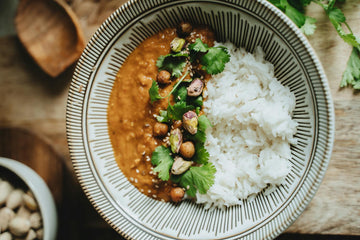In today’s fast-paced world, maintaining gut health is more important than ever. A healthy gut not only improves digestion but also boosts immunity and promotes overall well-being.
One of the best ways to support gut health is by incorporating superfoods into your diet. These nutrient-dense foods are packed with essential vitamins, minerals, and antioxidants that can help heal and protect the gut.
In this article, we’ll explore some of the best superfoods for gut health and how you can easily incorporate them into your daily routine.
A Quick Look at the Top Superfoods for Digestive Support
- Prebiotics, Probiotics, and Synbiotics
- Leafy Greens
- Turmeric
- Ginger
- Chia Seeds
- Oats
- Asparagus
- Flaxseeds
- Peppermint
1:Prebiotics, Probiotics, and Synbiotics

Prebiotics are non-digestible fibers that promote the growth of beneficial bacteria in the gut, such as inulin found in chicory root. Probiotics are live bacteria that provide health benefits when consumed, such as lactobacillus in yogurt. Synbiotics are a combination of prebiotics and probiotics, working together to improve gut health. They help maintain a healthy balance of gut bacteria, supporting digestion and overall health. Prebiotics, probiotics, and synbiotics can help alleviate symptoms of digestive disorders like irritable bowel syndrome (IBS) and improve nutrient absorption. Including these ingredients in your diet can contribute to better digestive health and overall well-being.
2:Leafy Greens

Leafy greens, such as spinach and kale are rich in fiber, which aids in digestion by promoting regular bowel movements and preventing constipation. They also contain antioxidants, such as vitamins A and C, which help reduce inflammation in the gut and protect against digestive disorders. Additionally, leafy greens are a good source of magnesium, which plays a crucial role in muscle contraction, including the muscles in the digestive tract. Including leafy greens in your diet can help support overall digestive health, improve gut function, and reduce the risk of developing digestive issues.
3:Turmeric

Turmeric is a spice that has been used for centuries in traditional medicine for its digestive health benefits. It contains a compound called curcumin, which has anti-inflammatory properties that can help reduce inflammation in the gut and improve digestion. Curcumin also stimulates the gallbladder to produce bile, which aids in the digestion of fats. Turmeric can help alleviate symptoms of indigestion, such as bloating and gas, and may also help protect the gut lining from damage. Including turmeric in your diet, either by using the spice in cooking or taking a supplement, can help support digestive health and overall well-being.
4:Ginger

Ginger is well-known for its ability to soothe digestive issues and promote overall gut health. It contains compounds like gingerol and shogaol, which have anti-inflammatory properties that can help reduce inflammation in the gut and improve digestion. Ginger also stimulates the production of digestive enzymes, which can aid in the breakdown of food and help alleviate symptoms of indigestion, such as bloating and gas. Additionally, ginger has been shown to help relieve nausea and vomiting, making it a valuable remedy for digestive issues. Including ginger in your diet, either by using it in cooking or drinking ginger tea, can help support digestive health and alleviate digestive discomfort.
5:Chia Seeds

Chia seeds are tiny powerhouses packed with fiber, omega-3 fatty acids, and antioxidants, all of which contribute to digestive health. The high fiber content in chia seeds helps promote regular bowel movements and prevent constipation. Omega-3 fatty acids reduce inflammation in the gut, which can alleviate symptoms of digestive disorders like irritable bowel syndrome (IBS). The antioxidants in chia seeds help protect the gut lining from damage caused by free radicals, promoting overall gut health. Chia seeds can be easily incorporated into your diet by adding them to smoothies, oatmeal, or yogurt, providing a nutritious boost for your digestive system.
6:Oats

Oats are a fantastic source of soluble fiber, which is beneficial for digestive health. Soluble fiber absorbs water in the digestive tract, forming a gel-like substance that helps soften stool and ease bowel movements. This can be particularly helpful for people with constipation or irritable bowel syndrome (IBS). Oats also contain insoluble fiber, which adds bulk to stool and helps it pass more quickly through the digestive system. Additionally, oats contain beta-glucans, a type of soluble fiber that has been shown to have prebiotic effects, promoting the growth of beneficial bacteria in the gut. Incorporating oats into your diet can help support overall digestive health and regularity.
7:Asparagus

Asparagus is a nutritious vegetable that offers several benefits for digestive health. It is a good source of dietary fiber, which aids in digestion by promoting regular bowel movements and preventing constipation. Additionally, asparagus contains prebiotics, which are non-digestible fibers that promote the growth of beneficial bacteria in the gut. These bacteria play a crucial role in maintaining a healthy digestive system and overall well-being. Asparagus also contains antioxidants and anti-inflammatory compounds that can help reduce inflammation in the gut and protect against digestive disorders. Including asparagus in your diet can help support a healthy gut and improve digestion.
8:Flaxseeds

Flaxseeds are a rich source of fiber, both soluble and insoluble, which is beneficial for digestive health. Soluble fiber absorbs water and forms a gel-like substance in the digestive tract, helping to soften stool and promote regular bowel movements. Insoluble fiber adds bulk to stool, aiding its passage through the digestive system and preventing constipation. Flaxseeds also contain omega-3 fatty acids, which have anti-inflammatory properties that can help reduce inflammation in the gut and alleviate symptoms of digestive disorders like irritable bowel syndrome (IBS). Additionally, flaxseeds are a good source of lignans, which act as antioxidants and may contribute to gut health. Incorporating flaxseeds into your diet can help support digestive health and overall well-being.
9:Peppermint

Peppermint has long been used for its digestive health benefits. It contains menthol, which has a relaxing effect on the muscles of the digestive tract, helping to relieve symptoms of indigestion, such as gas, bloating, and stomach cramps. Peppermint oil has been shown to reduce spasms in the colon, making it a helpful remedy for irritable bowel syndrome (IBS). Peppermint also has antimicrobial properties, which may help fight off harmful bacteria in the digestive tract. Drinking peppermint tea or taking peppermint oil capsules can help soothe digestive discomfort and support overall digestive health.












